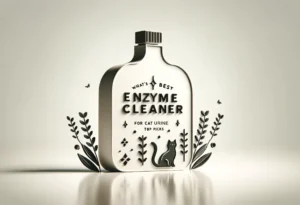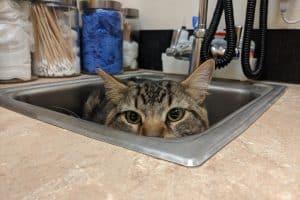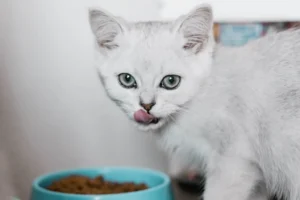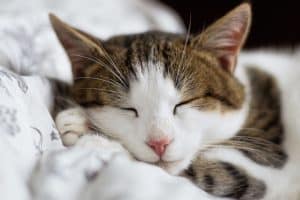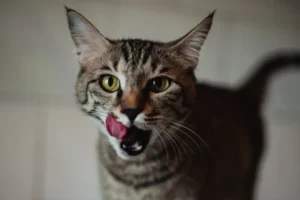Cats may love to explore new scents and flavors, but there’s one food you should always keep away from your feline friend: onions. But why can’t cats eat onion?
Cats lack a specific enzyme needed to digest onions, which can lead to serious health issues. Let’s explore the reasons behind why cats can’t eat onion and how to keep your furry friend safe.
The Dangers of Onion for Cats
Onions contain sulfur compounds that can be highly toxic to cats. These compounds can cause damage to your cat’s red blood cells, leading to a condition called hemolytic anemia. This dangerous condition can result in symptoms such as weakness, lethargy, pale gums, and even collapse. It’s crucial to keep onions away from your feline friend to prevent any potential harm.
An additional unique insight about onions and cats is that cooked onions are just as harmful as raw ones. The toxic compounds in onions do not break down through the cooking process, so even a small amount of cooked onion can still pose a serious risk to your cat’s health. It’s best to err on the side of caution and avoid feeding any type of onion to your furry companion.
Symptoms of Onion Poisoning in Cats
If your cat has ingested onion, there are several symptoms to watch out for. These may include vomiting, diarrhea, a rapid heart rate, difficulty breathing, and discolored urine. If you notice any of these signs, it’s important to seek immediate veterinary care for your cat.
Remember, cats are obligate carnivores, which means their digestive systems are not equipped to handle certain foods like onions. Even a small amount of onion can have serious consequences for your cat’s health. So, it’s essential to be vigilant and keep all onion-containing foods out of reach of your curious feline friend. Your cat’s well-being is worth the extra effort to ensure they stay safe and healthy.
Treatment for Onion Poisoning in Cats
If you suspect your furry friend has gotten into some onions, it’s crucial to act fast. Onion poisoning in cats can lead to some serious health issues. The first step is to contact your vet immediately for guidance. They may recommend inducing vomiting or other treatments based on the severity of the situation. Never try home remedies without professional advice as they could do more harm than good. Monitoring your cat closely for any symptoms like lethargy, vomiting, or pale gums is key. Remember, quick action could make all the difference in your cat’s recovery.
Safe Alternatives for Cats
While onions are a big no-no for our feline friends, there are plenty of safe and healthy alternatives to keep them satisfied. Treats like cooked, lean meats such as chicken or turkey are great options. You can also offer small pieces of cooked vegetables like carrots or green beans. Another favorite among cats is plain, cooked fish. Just remember, always introduce new foods gradually to prevent any tummy troubles. And of course, fresh water should always be available for your kitty to stay hydrated and healthy. Your cat will thank you for the tasty and safe treats!
Importance of a Balanced Diet for Cats
Cats are independent creatures, but when it comes to their diet, they need our guidance. A balanced diet is crucial for your feline friend’s health and well-being, just like how we need a variety of foods to stay healthy. Cats require essential nutrients like proteins, fats, vitamins, and minerals to thrive. Proteins help build strong muscles, fats provide energy, and vitamins and minerals keep their bodies functioning properly.
Besides, cats are obligate carnivores, which means meat should be the main component of their diet. Feeding your cat high-quality cat food ensures they get all the necessary nutrients in the right amounts. So, next time you’re picking up cat food at the store, remember the importance of a balanced diet for your furball.
Keeping Your Home Onion-Free
Did you know that onions can be toxic to cats? This vegetable, often used in cooking, is a big no-no for our feline friends. Onions contain compounds that can damage a cat’s red blood cells, leading to potentially serious health issues. It’s important to be mindful of what your cat has access to at home to keep them safe.
To ensure your home is onion-free, be cautious when cooking and storing food. Keep onions out of reach of your cat and make sure they don’t have access to any meals containing onions. If you suspect your cat has ingested onion, look out for symptoms like vomiting, diarrhea, lethargy, or difficulty breathing, and contact your veterinarian immediately. Let’s keep our homes safe and onion-free for our beloved cats.
Fun Facts About Cat Nutrition
Did you know that cats are obligate carnivores, meaning their diet must consist mainly of meat? This is why protein is crucial for their health! But here’s a fun fact: cats lack the necessary enzymes to properly digest onions. These vegetables contain compounds that can cause damage to a cat’s red blood cells, leading to a condition called hemolytic anemia. So, it’s best to keep onions far away from your feline friend’s food bowl to ensure their well-being.
A Cat-Friendly Recipe
Looking for a delicious treat to spoil your kitty with? Try this simple and cat-friendly tuna snack: – Ingredients: – 1 can of tuna in water – 1 egg – 1 tablespoon of coconut flour – Instructions: 1. Preheat the oven to 350°F. 2. Mix the tuna (drained), egg, and coconut flour in a bowl. 3. Form small balls and place them on a baking sheet. 4. Bake for 10-15 minutes until golden brown. Your cat will love this tasty snack, and you can rest easy knowing that it’s free from any harmful ingredients like onions.
Alex, a passionate animal lover, has experience in training and understanding animal behavior. As a proud pet parent to two dogs and three cats, he founded AnimalReport.net to share insights from animal experts and expand his knowledge of the animal kingdom.

